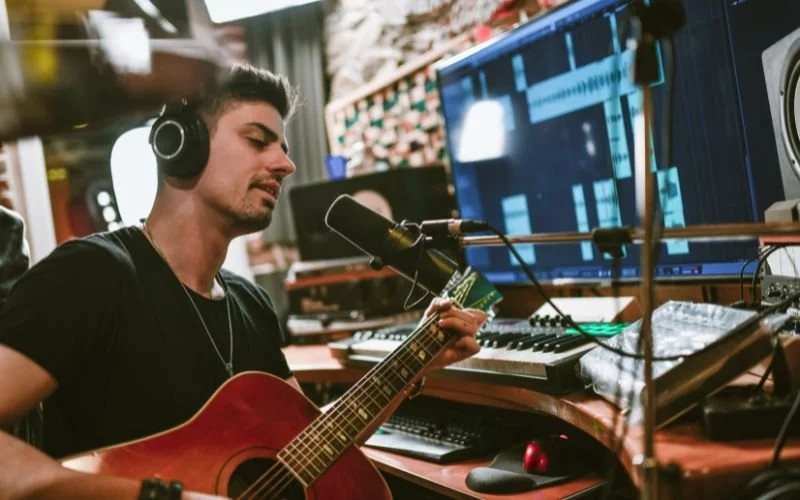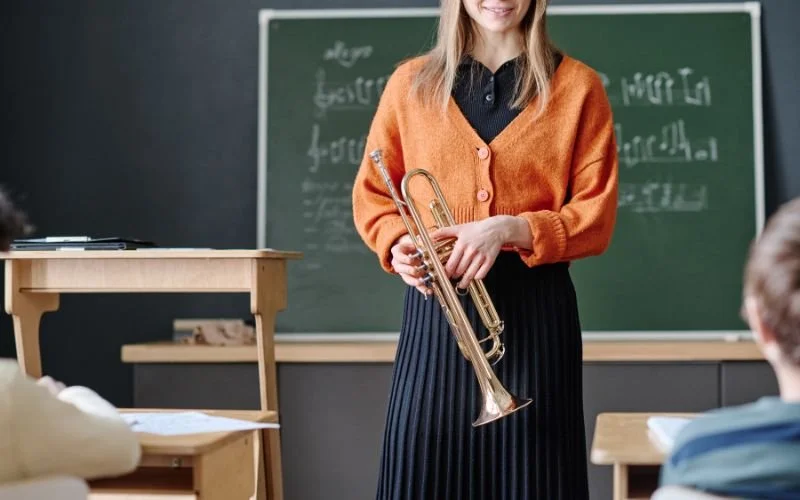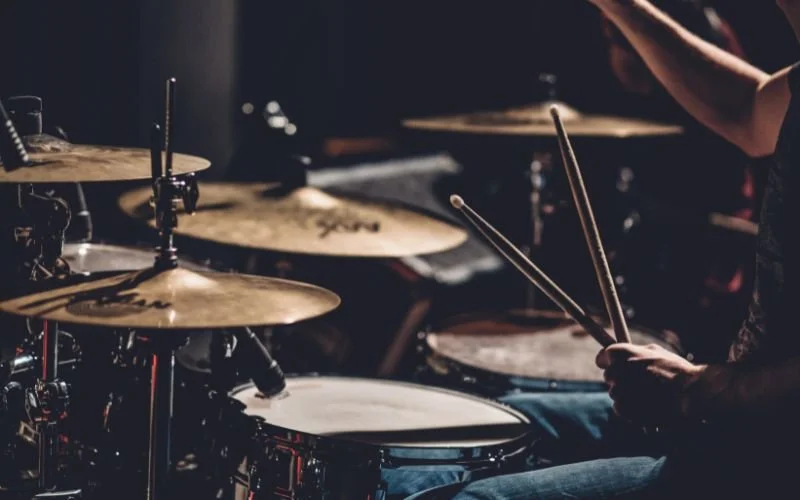Frédéric Renaudin: portrait of a stage accompanist
Sting, Stevie Wonder, Anastacia and Julien Clerc all have one thing in common. And that is? They have all been accompanied on stage, on TV or on the radio by Frédéric Renaudin. A long-standing multi-instrumentalist, Frédéric Renaudin masters piano, keyboards, saxophones, bass, flugelhorn, flute and... singing. And that's not all! We had the honor of chatting with this music legend and avid user of the Newzik. We talked to him about the facets of his profession, the evolution of his practice and his tips as an accompanist / "stage coach".
What job(s) do you do today?
Today, more than half of my activity consists of being a musician and playing several instruments. My favorite activities are composing, arranging and producing. So I have a recording studio at home where I also make music. In the past, I was mainly an accompanying musician, a "well-known" singer, let's say. So, to sum up, I was originally a musician and accompanist. Today, I've been touring with various artists in France and abroad for over 25 years.
Today, I've decided to tour less. I still do shows, big events, right and left. I work from my studio, in a more sedentary way.
What does the job of scenic accompanist entail?
The job of accompanist varies from one singer to another, but generally speaking, it consists of being at the service of the musical composition, on the one hand, and at the service of the accompanied singer, on the other.
Our job is to make sure that the singer we accompany is as comfortable as possible on stage, and as effective and convincing as possible in his or her work. Anyone who looks at this profession from an egocentric angle, as an opportunity to make a career with the aim of being famous, isn't worth it. If that's the case, you need to change professions right away. When you're playing in front of 80,000 people, nobody cares what the pianist behind the singer is called, it makes no difference to your life!
It's an enormous pleasure, because you feel very useful. When a singer is on stage, whoever he is, he's on the edge. The stage accompanist is there to comfort him. And it's nice to be able to put them in the best possible conditions for their performance. Some singers will have privileged exchanges with their musicians. So, in other words, on stage, you have to be extremely available in your facial expressions, in your attentions... And conversely, there are singers who are mainly in contact with their audience, in which case the musicians are there to carry out their work more independently. And there, they are expected to be beyond reproach...
Could you describe a "typical" day preparing for a live concert with an artist or band?
When you're on tour, it's not all glamorous, because most of the time you're traveling. In people's imaginations, the life of a musician consists of spending a lot of time in nice hotels, but in fact we spend very little time there because we move from one city to another almost every day.
We arrive in a new town around 3 p.m., then move on to adjustments at 17 to make what we call "a balance". Here, we check that all our equipment has been correctly connected, set up and equipped by the technicians in charge of our affairs. We then do a short live sound test with the singer, to get him used to the sound of the hall. All this lasts about 1 hour, 1h30. Then we eat, get ready for the concert, get dressed, do the concert, and once the concert's over, we go to the hotel, sleep, and meet up the next morning in the lobby to leave for the next town. In fact, it's extremely repetitive. I'm going to shatter a lot of dreams. We don't visit many cities. We mostly visit hotels...
What tricks do you use to adapt to playing several instruments simultaneously?
In fact, there's no school for it. The first major tour on which I was really a multi-instrumentalist was a Julien Clerc tour. At the time, there were only two of us on tour with him. The artist wanted two multi-instrumentalists. The other musician is Evert Verhees, a great Belgian musician who has accompanied Maurane, Eddy Mitchell... He was originally a bass player, but also played guitar, piano, percussion and sang. On this tour, I played keyboards, bass, flute, saxophone, trumpet, a bit of everything. It was on this tour that I realized what it meant to switch from one instrument to another, from one song to another. It's a pretty complicated exercise; it's not just a matter of doing your piece on piano or bass. You have to quickly get into the right frame of mind, the right physical attitude, the right intention, which varies according to each instrument.
It's a real challenge of concentration, you have to be able to change roles in a matter of seconds. It's like asking an actor on stage to change roles with a snap of the fingers. It's not at all intuitive. On the other hand, it does make a big difference in terms of concentration. When you do a show where you've only got one instrument to play, it's easy!
As accompanists, we're not virtuosos on all these instruments, but we're capable of producing what's expected. When we're asked to play a saxophone part, we play it correctly every night in front of 5,000 people.
What I like is when I know that the pianist I'm replacing will be completely relaxed to experience his concerts exactly as he wishes. The secret is that there's no feat to achieve, it's all about doing what we expect of ourselves and making the singer as comfortable as possible. If we can do that, it's a done deal.
How many instruments do you master professionally? Do you compose with all these instruments?
I started out as a pianist. My main and favorite instrument is the piano (keyboards in general). My personal tastes led me to learn other instruments, first for "fun", and then soon I was called upon to work on tours as a multi-instrumentalist. In fact, for some time now, tour operators have been looking for ways to save money. As a result, they're hiring fewer musicians and asking them to have multiple skills. By playing the game, I've learned several instruments, and it's just like modern languages: the more you learn, the faster you learn.
On the other hand, I only compose on the piano. The piano allows me to create melodies and harmonies. It's an extremely complete instrument for that. So anything I have to compose, I generally do on the piano.
How and where did you discover the Newzik application?
I discovered Newzik thanks to Jean-Félix Lalanne, who was the app's ambassador, the app's original developer. He said to me, and I quote, "I've got to show you something incredible, it's French and it's great! Jean-Félix suggested that I test the app in the context of the show La nuit de la dépression, coordinated by Raphaël Mezrahi at the Folies Bergères. At the time, people weren't really using apps. As a slightly geeky pianist, I agreed. Pianists are used to using computers and synthesizers, so they're not afraid of new technologies. Anyway, I tried it out and thought it was great. I started using it straight away. The Newzik team had invited us to their home to try out their application, which was really interesting. Then I was part of the Victoires de la Musique orchestra, and I talked to Paul Rouger, who was our musical director, about it, and we started using it to record the show. Newzik came in to train us, and then the take-up spread like a listening chain.
"Today, I don't have any paper or paper scores. If I have any, I scan them into Newzik. This allows me to manage thousands of scores on a single tablet. It's simply brilliant!
How do you use Newzik today, and what advantages does it bring to your day-to-day work?
The new generation of musicians has at least one smartphone, if not a tablet. Orchestras quickly realized that Newzik was extremely simple. The great thing is that if there's an articulation, a notion that hasn't been noted on the score, you discover it as you rehearse. The conductor has access to the entire orchestra on the network, and writes the annotation on his iPad and it immediately appears on the 60 scores, making sure that it's in the right place, that it's the right thing.
" We save an incredible amount of time on sheet music, which is great. "
When rehearsing with a singer, there are tonality problems. So, rather than sending it back to the copyist (it can take three hours to copy all the parts in your tonality), in just three and a half seconds, thanks to Newzik, we have a way of doing it and transposing all the parts for a full orchestra. A huge time-saver!
In the past, orchestras had what they called an orchestra director, who looked after the instruments, the puppets and normally the scores. They had incredible boxes, thousands of pieces weighing three tons. Today, all they have is a fly case with 50 iPads and the orchestra's entire repertoire repertoire inside. So it's a hundred thousand times easier for everyone. We've moved on.
Do you use the application at home or in the studio?
Of course I use it! I use it. Yesterday, I was rehearsing with two colleagues for a repertoire I have to put together for next week. I spent the day with the Newzik active application. I don't have a paper notebook any more, it's been ages since I bought one. I don't need them anymore. What we do now is write our scores using a computer score-editing program, like Sibelius, and then transfer those scores to Newzik, quite simply. I use the application almost every day now. The only limit will be the fragile lifespan of the tablets. In any case, whether it's a rehearsal or a session, I use Newzik.
What do you remember as the best concert of your life?
Difficult to answer... There are great moments in every tour. But the last one I worked with was Sting. We did some incredible dates. I played with him on the night of his 70ᵉ birthday in Athens, at the foot of the Acropolis, overlooking the Acropolis. We played at the Pantheon in Paris. And there are only two artists who have played at the Pantheon. So a concert like that is incredible. It's something that stays with you and leaves a mark.




